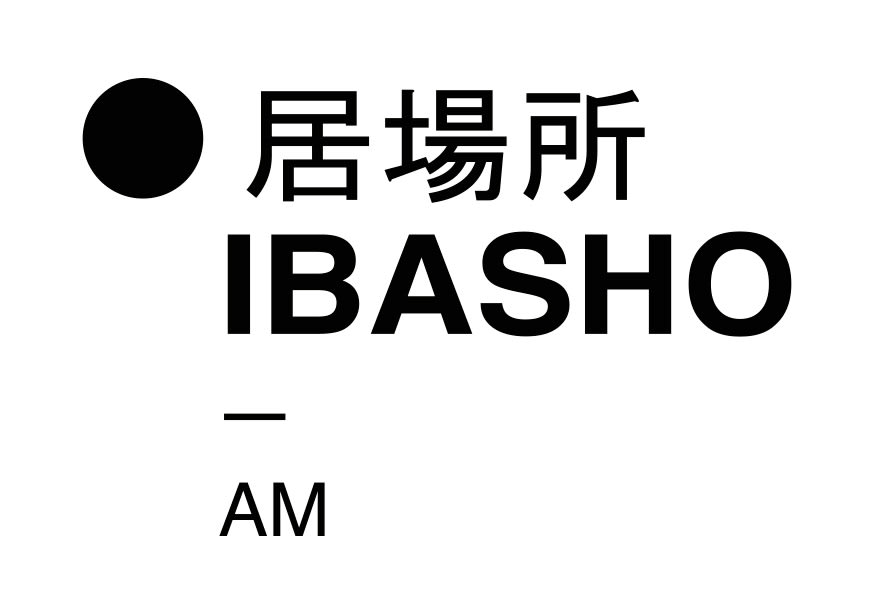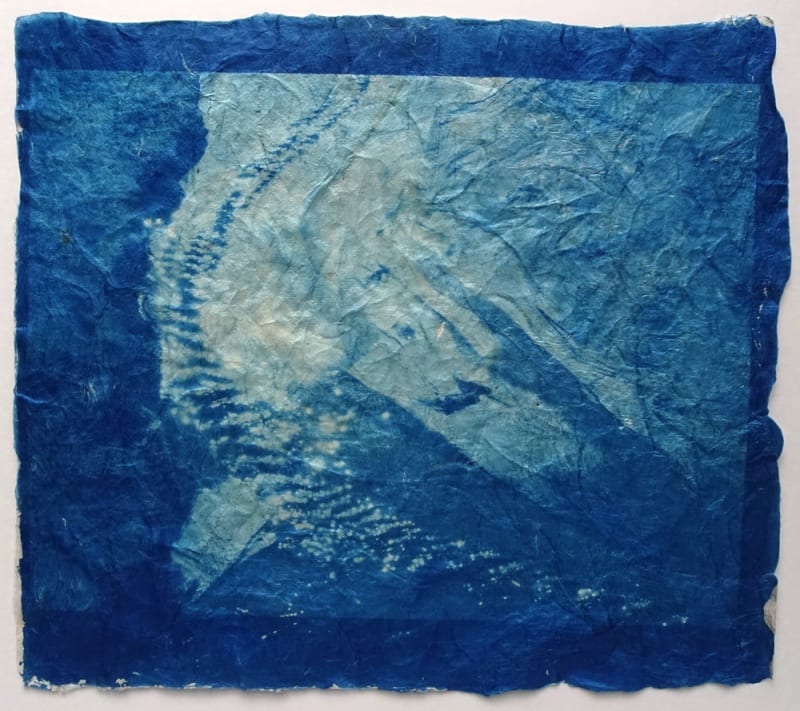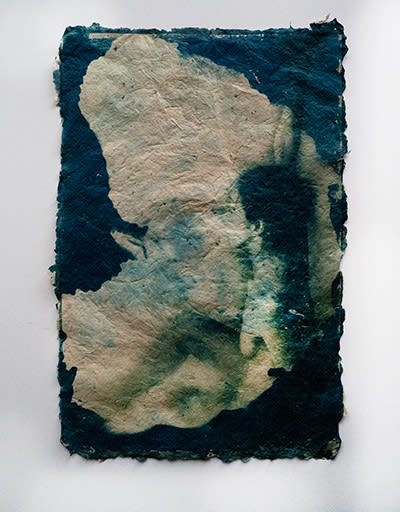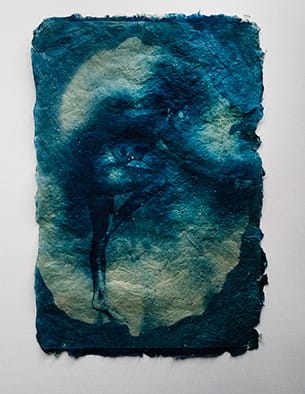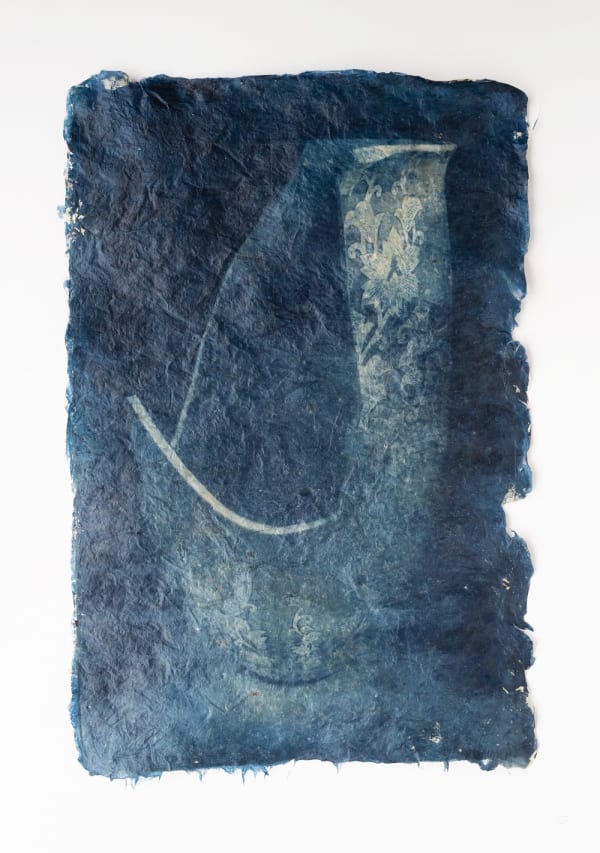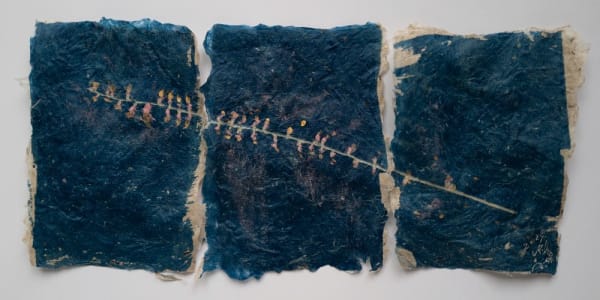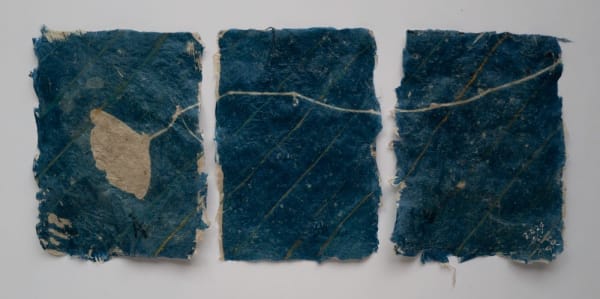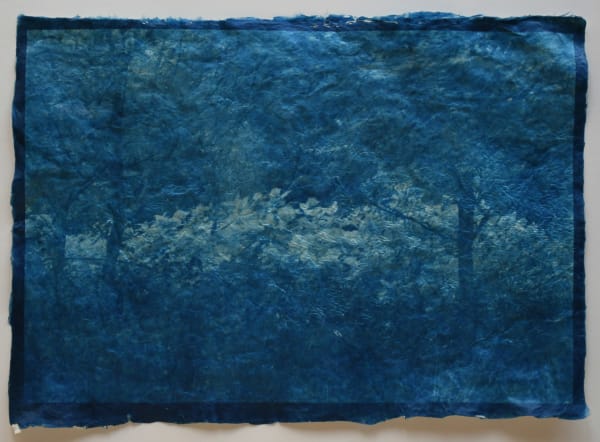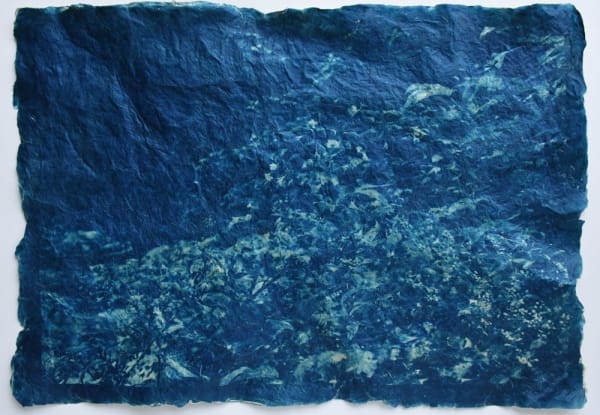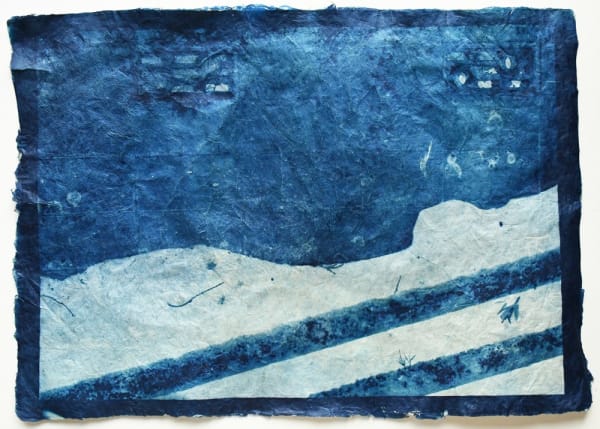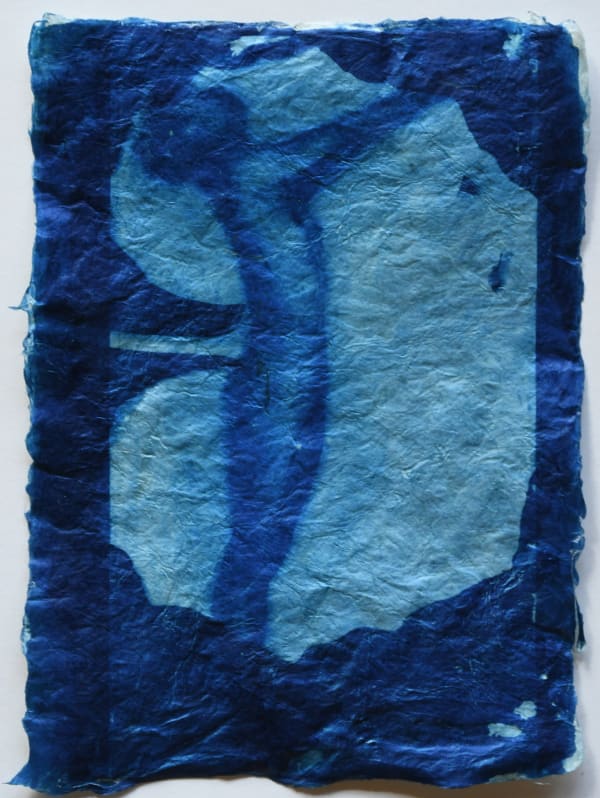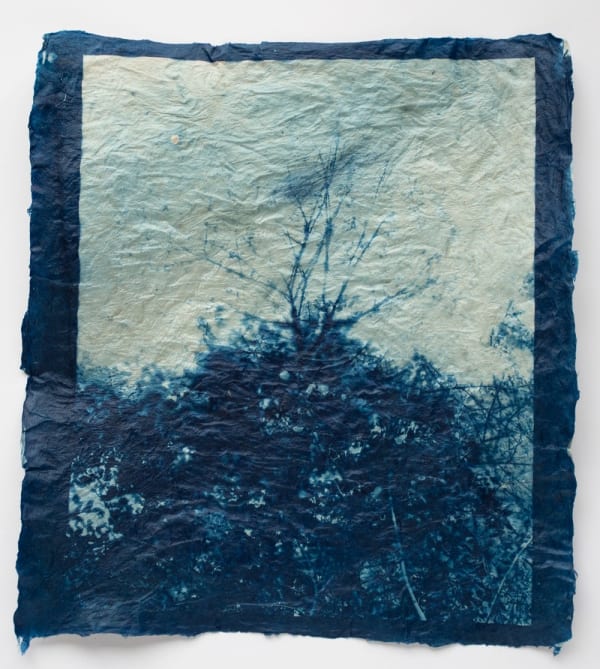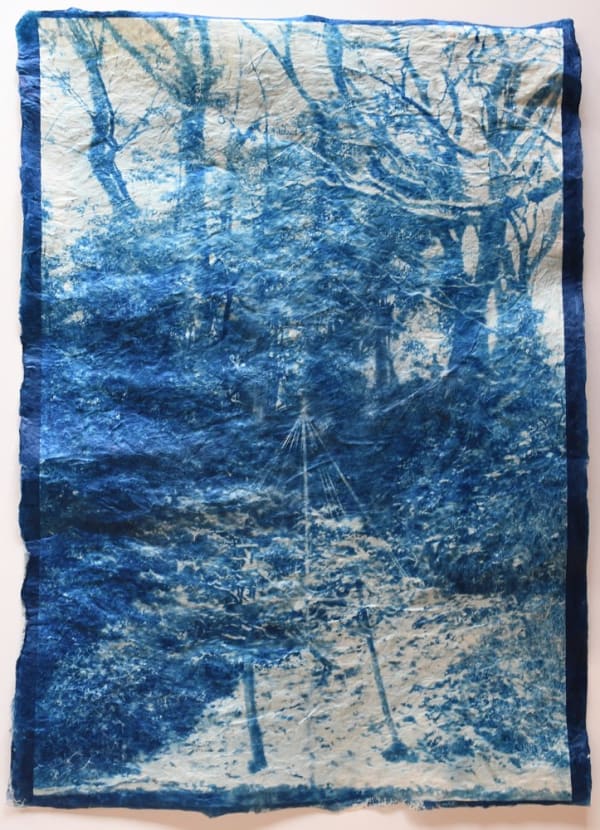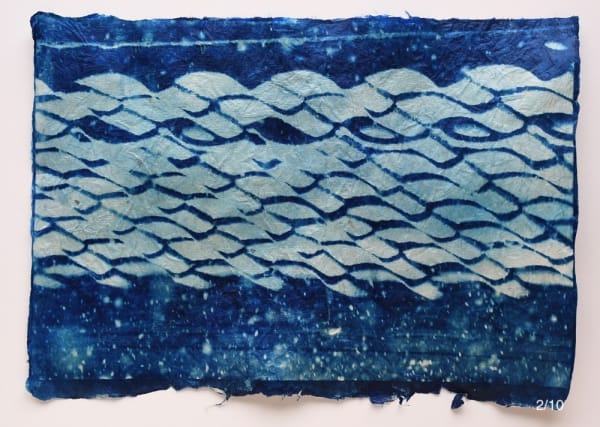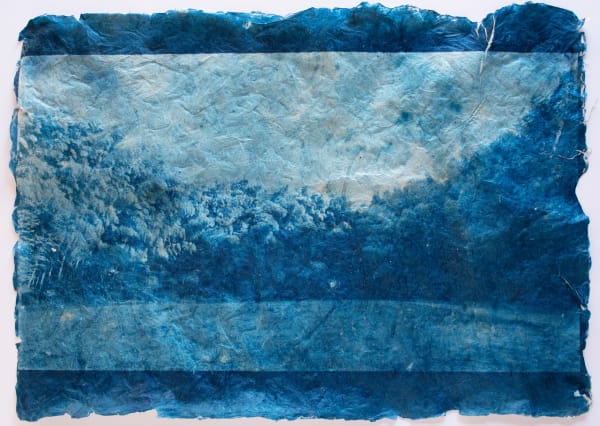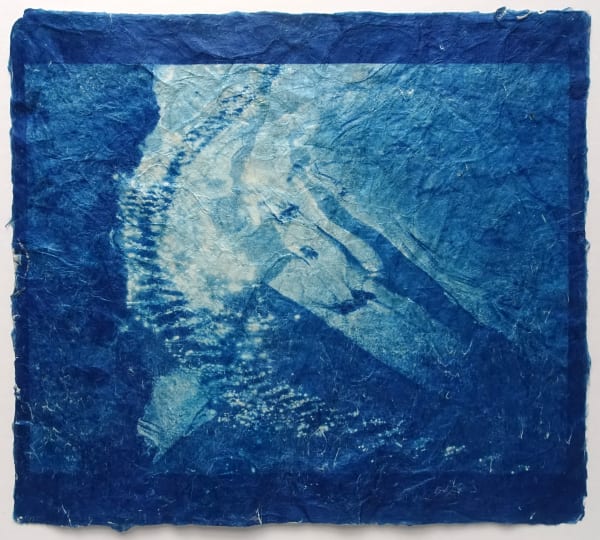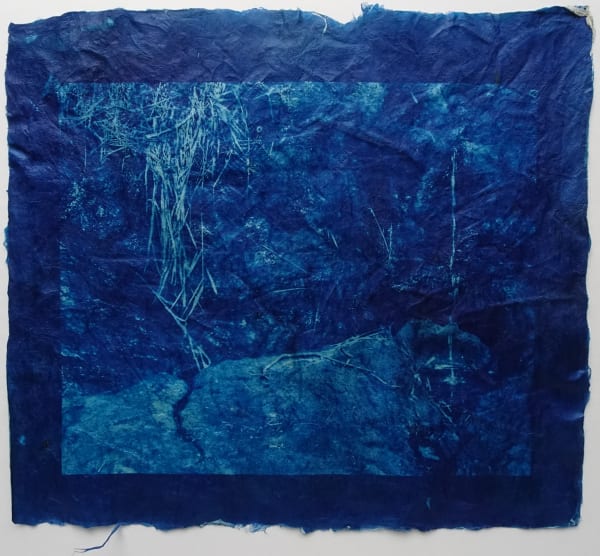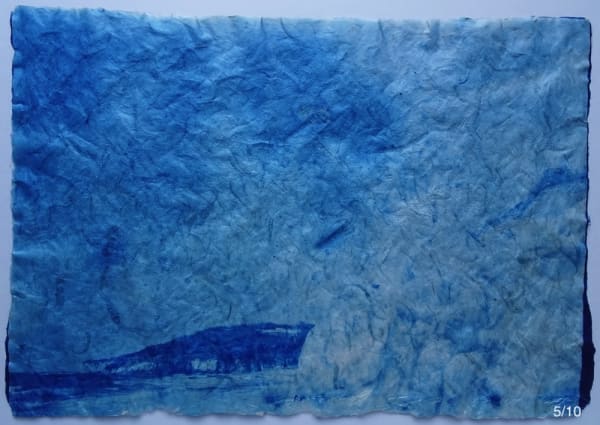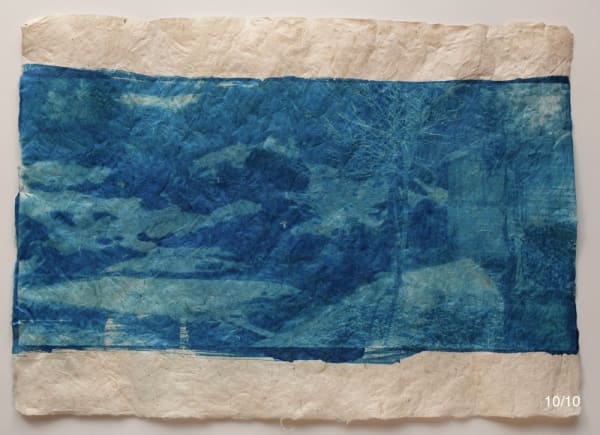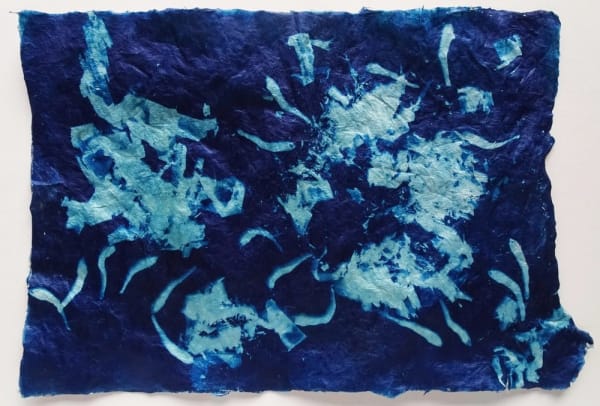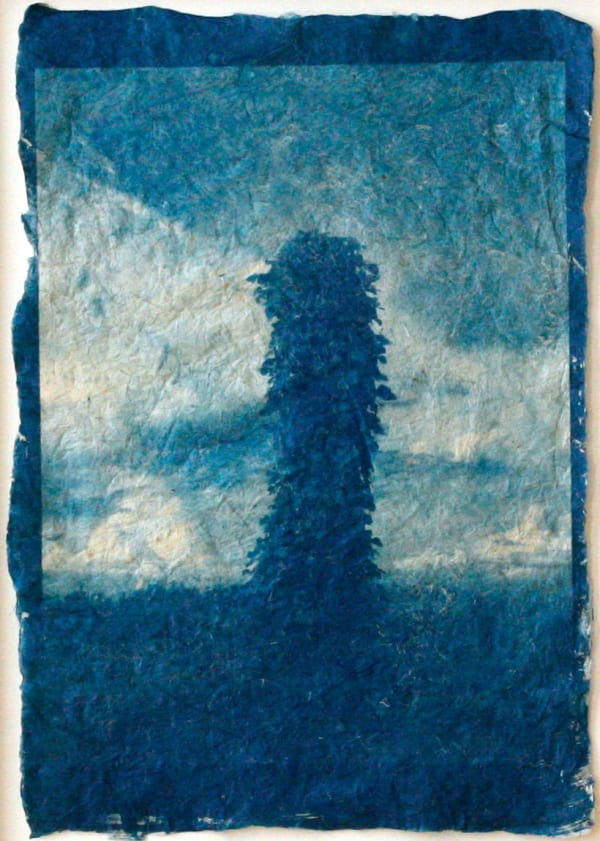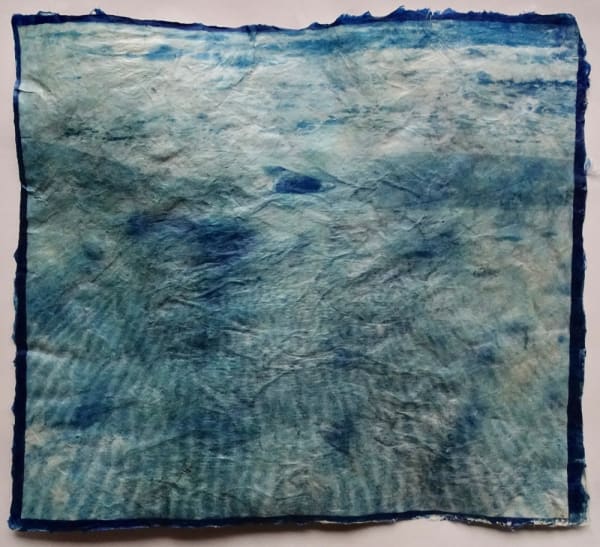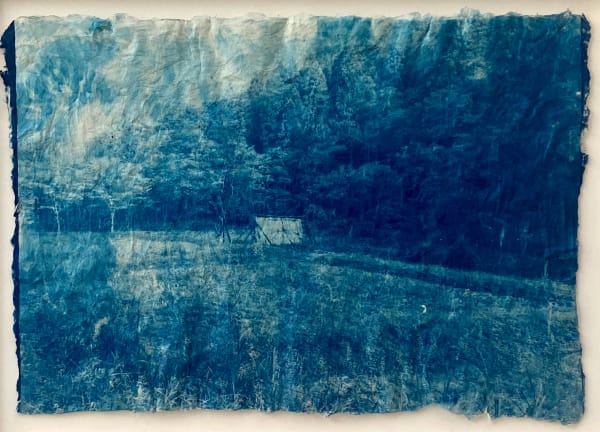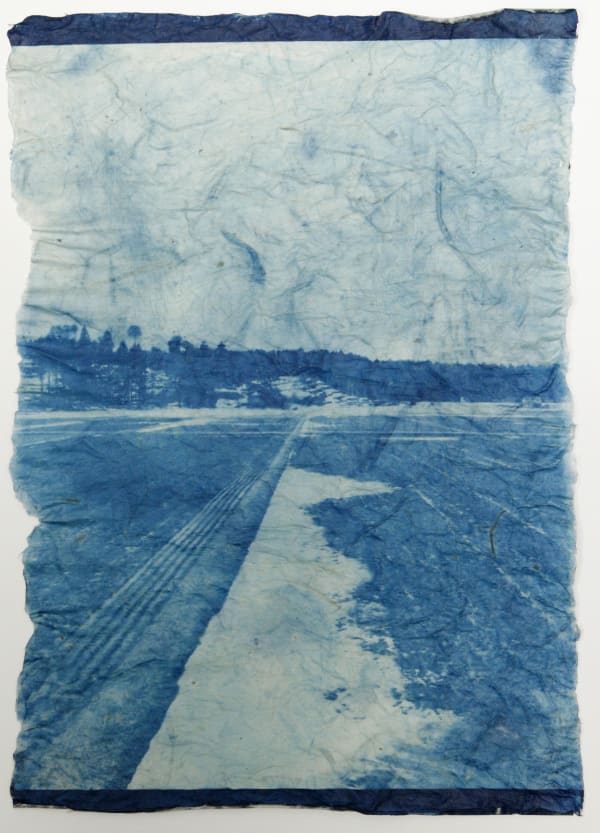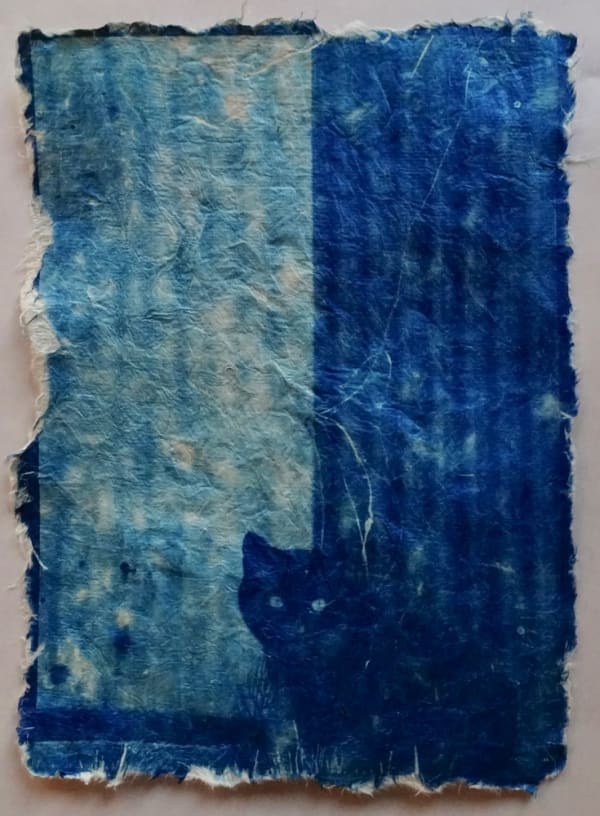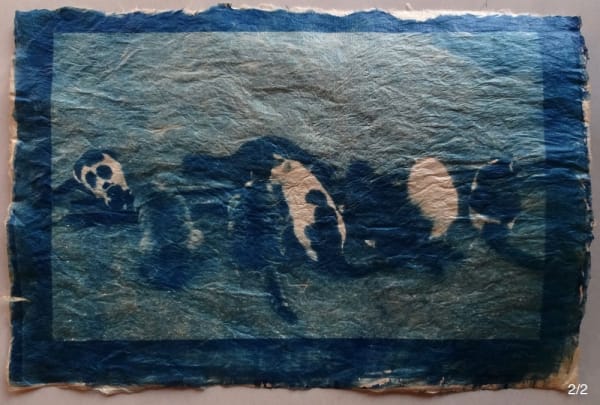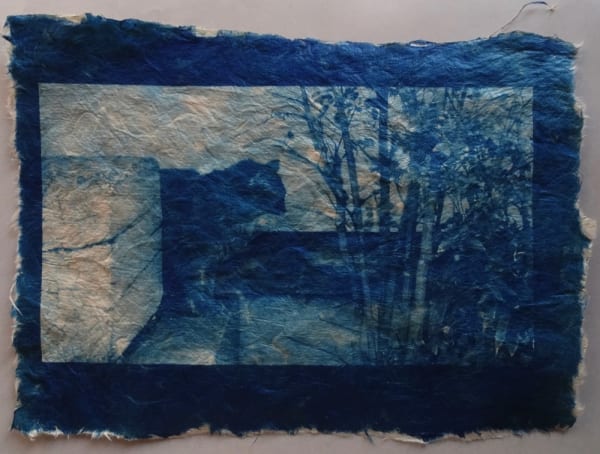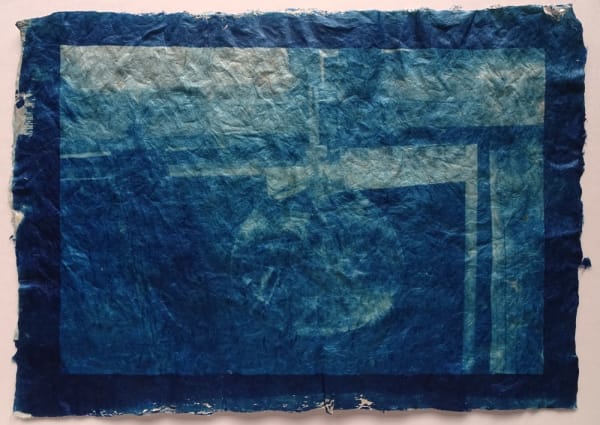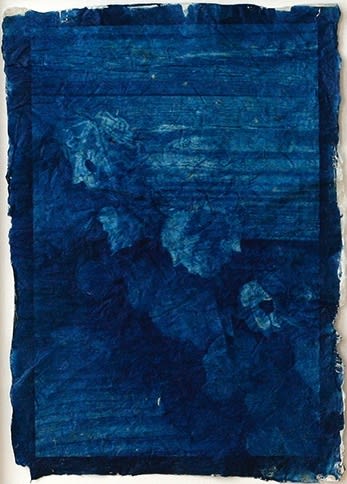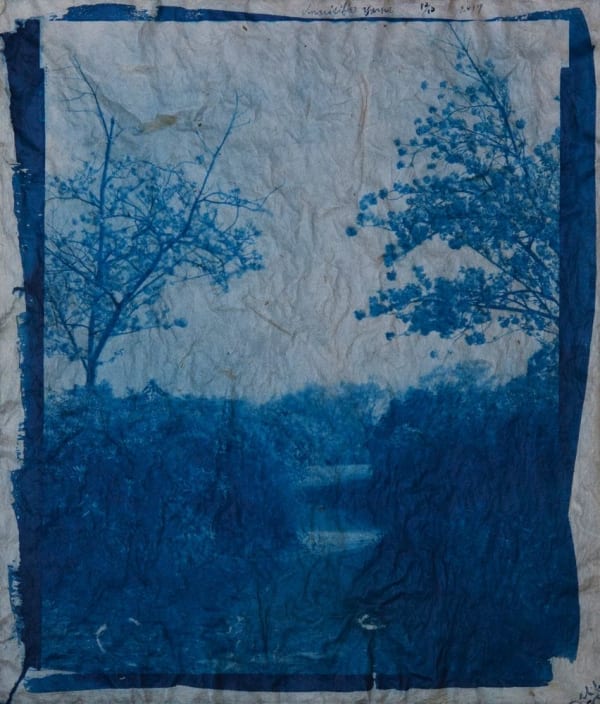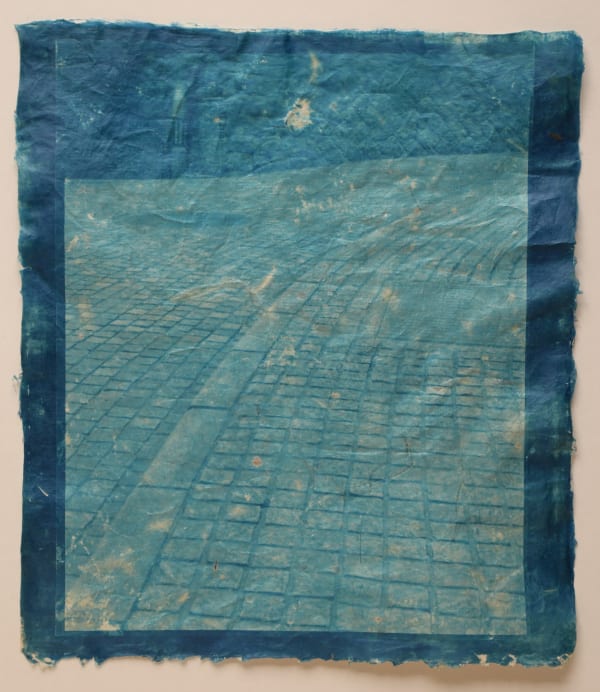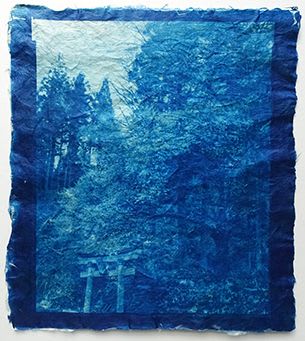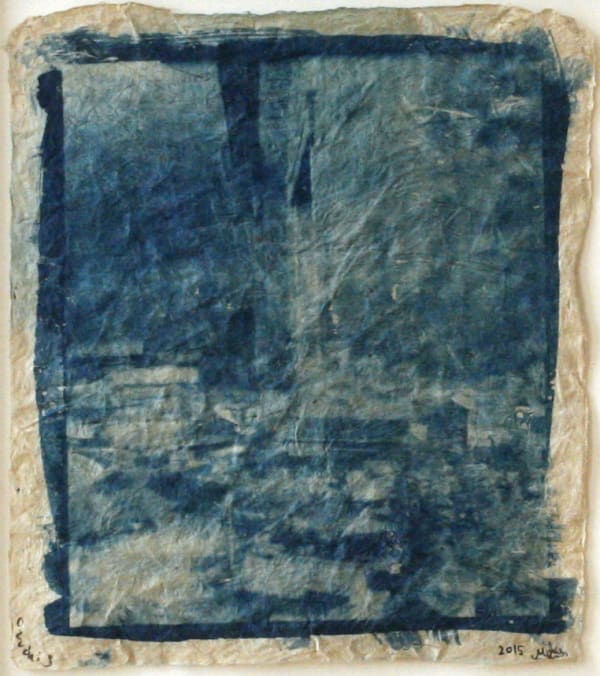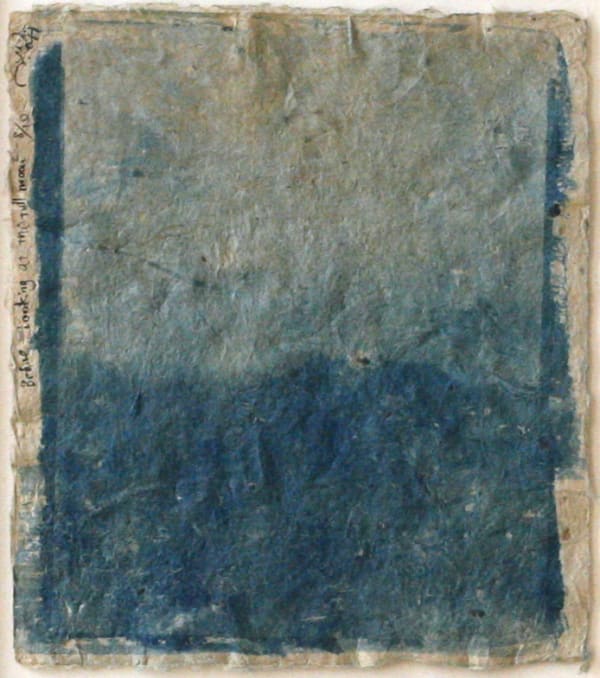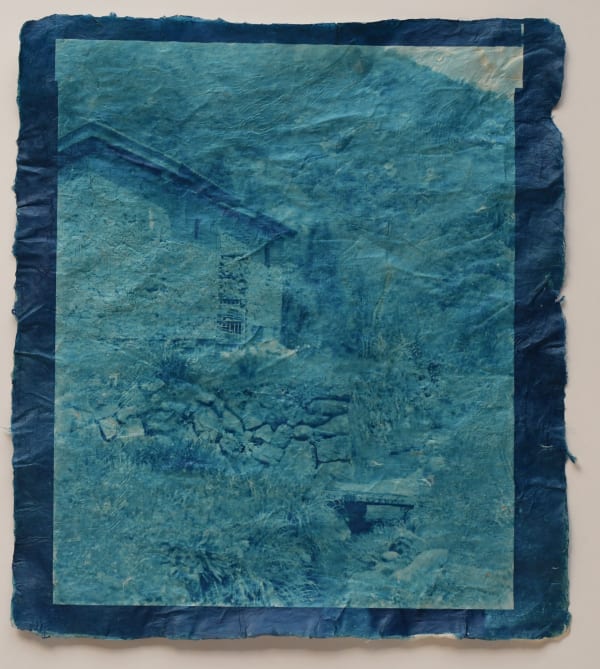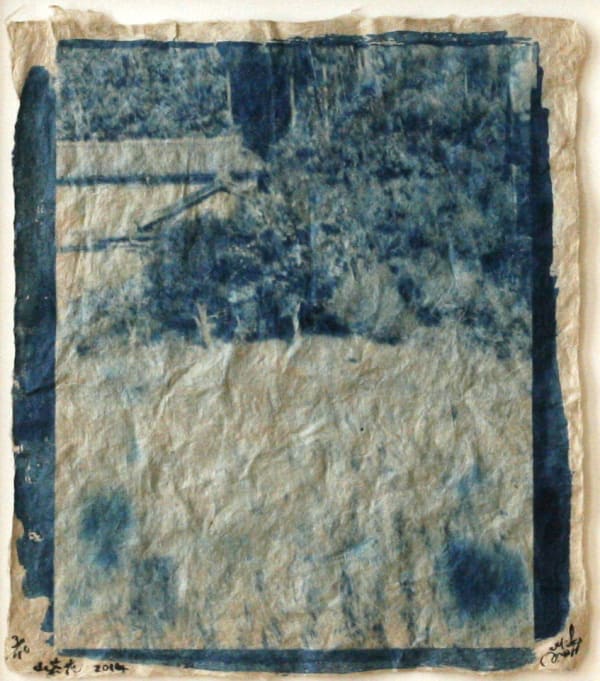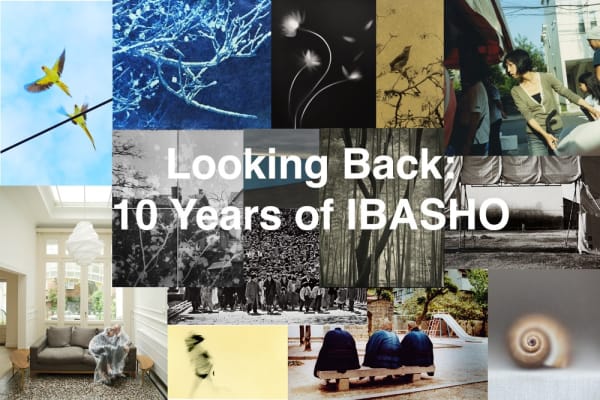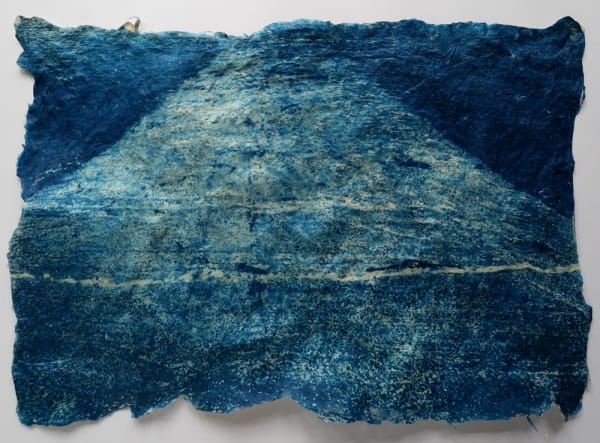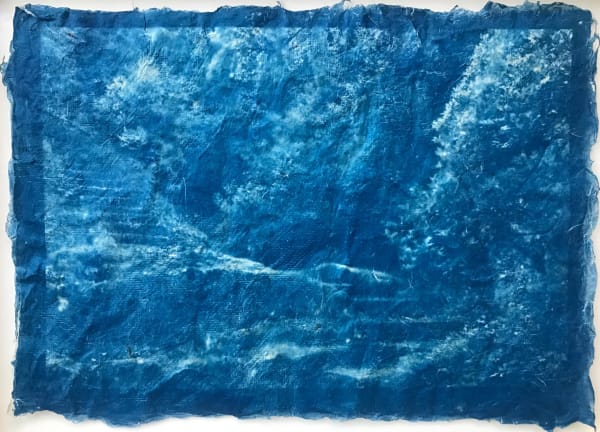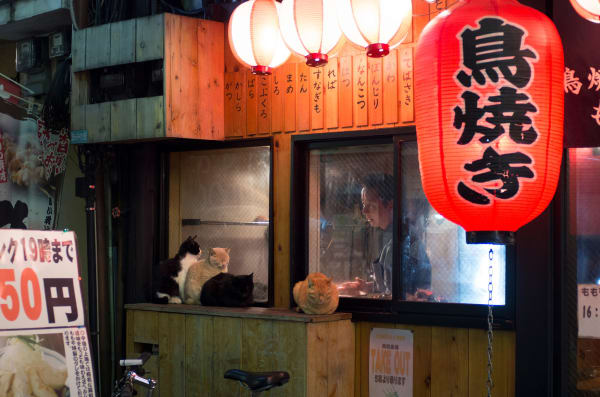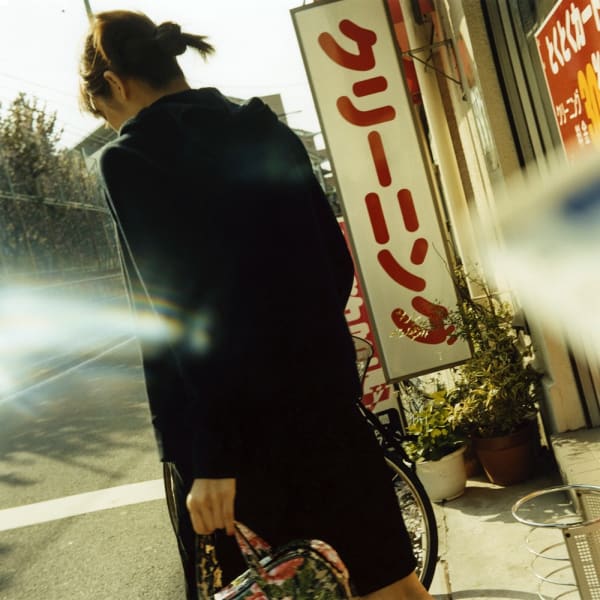Mika Horie
'Perfectly Imperfect': Horie Mika (1984)
Horie Mika is a Japanese photographic artist who focuses on creating cyanotypes on paper made by herself. Trees, water and light are the main elements that Horie uses to create her artworks.
Horie lives in Yamanaka Onsen, Kaga, Ishikawa prefecture, in a Meiji-era farmhouse and studio in the mountains. After the snow melts in spring, Horie drives up narrow winding roads into the mountains to fill her car with gampi branches—the raw material to make traditional paper. Horie processes the gampi fibers fully by hand into delicate-looking but sturdy paper, which is the material on which she prints cyanotype images of the landscapes, foliage, nearly-forgotten villages and objects in or around her home.
Horie’s photographic process is nearly as natural and time-consuming as her paper making. After having photographed her natural surroundings, Horie treats her paper with ferric ammonium citrate and potassium ferricyanide, places the negatives directly on top of the paper and allows the sun to expose them to shades of cyan and deep indigo. She then washes the paper with spring water to fixate the image and lets the art work dry in the wind.
Horie’s work is suffused with wabi-sabi. Her artworks are first of all the result of her process of working with natural materials. Furthermore, her prints are not perfect. They are all different, unique, even when they show the same image, because of the handmade paper and the ever-changing sunlight. Each print has a different texture, with uneven rims, some blurry parts and a large variety of tones of blue. The imagery is also very modest and humble. Horie’s way of living furthermore implies wabi-sabi:
“Wabi-sabi is simply the feeling of my daily life of creating. Each day I spend a significant amount of time catching its essence of tranquility, harmony, beauty and imperfection through shooting photos, making paper and cyanotype. I embrace the condition of gampi tree fiber, spring water and sunlight changing all the time. One day I realised that being surrounded by abundant nature has changed my mentality. I am getting to understand my imperfections.” - Mika Horie
Horie’s words clarify that wabi-sabi is first and foremost an integral part of how the Japanese think and feel and her work is very fitting to evoke a feeling of wabi-sabi.
-
 Fuki 21, 2025
Fuki 21, 2025 -
 Fuki 20, 2025
Fuki 20, 2025 -
 Fuki 19, 2025
Fuki 19, 2025 -
 Fuki 18, 2025
Fuki 18, 2025 -
 Fuki 17, 2025
Fuki 17, 2025 -
 Fuki 16, 2025
Fuki 16, 2025 -
 Fuki 15, 2025
Fuki 15, 2025 -
 Fuki 14, 2025
Fuki 14, 2025 -
 Fuki 13, 2025
Fuki 13, 2025 -
 Fuki 12, 2025
Fuki 12, 2025 -
 Susurrus, 2024
Susurrus, 2024 -
 Sakuradrop, 2024
Sakuradrop, 2024 -
 Matsu, 2024
Matsu, 2024 -
 Fuki XI, 2024
Fuki XI, 2024 -
 Fuki X, 2024
Fuki X, 2024 -
 Fuki VIII, 2024
Fuki VIII, 2024 -
 Fuki VII, 2024
Fuki VII, 2024 -
 Fuki VI, 2024
Fuki VI, 2024 -
 Fuki IX, 2024
Fuki IX, 2024 -
 Fragments of Earthquake IX, 2024
Fragments of Earthquake IX, 2024 -
 Fragment of the Earthquake IX, 2024
Fragment of the Earthquake IX, 2024 -
 Fragment of the Earthquake III, 2024
Fragment of the Earthquake III, 2024 -
 Fragment of the Earthquake III, 2024
Fragment of the Earthquake III, 2024 -
 Fragment of the Earthquake II, 2024
Fragment of the Earthquake II, 2024 -
 Fragment of the Earthquake I, 2024
Fragment of the Earthquake I, 2024 -
 Fragment of the earthquake I, 2024
Fragment of the earthquake I, 2024 -
 Antenoron filiforme , 2024
Antenoron filiforme , 2024 -
 Aki in Yamanaka, 2024
Aki in Yamanaka, 2024 -
 A Ginko Leaf , 2024
A Ginko Leaf , 2024 -
 Voyage without a road, 2023
Voyage without a road, 2023 -
 She wears kimon and makes cocktails every night, 2023
She wears kimon and makes cocktails every night, 2023 -
 Ori, 2023
Ori, 2023 -
 Kiku II, 2023
Kiku II, 2023 -
 White Heron in the Reeds, 2022
White Heron in the Reeds, 2022 -
 Vibrations of Trees and Water, 2022
Vibrations of Trees and Water, 2022 -
 Tsubaki, 2022
Tsubaki, 2022 -
 This is how pine trees and dinosaurs were born, 2022
This is how pine trees and dinosaurs were born, 2022 -
 A Sacred Place, 2022
A Sacred Place, 2022 -
 A Bird Chirps like a Piece of Twig, 2022
A Bird Chirps like a Piece of Twig, 2022 -
 Water leads itself to its vessel, 2021
Water leads itself to its vessel, 2021 -
 Untouched Snowscape, 2021
Untouched Snowscape, 2021 -
 The mountains, houses, and rice plants rise above the plains, 2021
The mountains, houses, and rice plants rise above the plains, 2021 -
 The moonlight illuminated deutzia flowers, 2021
The moonlight illuminated deutzia flowers, 2021 -
 The Composition of the Soil I, 2021
The Composition of the Soil I, 2021 -
 Swinging Young Bracken, 2021
Swinging Young Bracken, 2021 -
 Swinging young bracken, 2021
Swinging young bracken, 2021 -
 In the Pond, in the Temple, 2021
In the Pond, in the Temple, 2021 -
 In Front of the Wall, 2021
In Front of the Wall, 2021 -
 Fuki 1, 2021
Fuki 1, 2021 -
 A small growth, 2021
A small growth, 2021 -
 A Hidden Bamboo Grove, 2021
A Hidden Bamboo Grove, 2021 -
 A hidden bamboo grove, 2021
A hidden bamboo grove, 2021 -
 Snow melts after a spring breeze, 2020/2021
Snow melts after a spring breeze, 2020/2021 -
 Yukitsuri II, 2020
Yukitsuri II, 2020 -
 Yukitsuri I, 2020
Yukitsuri I, 2020 -
 Under two shades of trees, 2020
Under two shades of trees, 2020 -
 Snow melts after a spring breeze, 2020
Snow melts after a spring breeze, 2020 -
 Silent in the Morning, 2020
Silent in the Morning, 2020 -
 Silent in the morning, 2020
Silent in the morning, 2020 -
 Silent in the morning, 2020
Silent in the morning, 2020 -
 A silver lining, 2020
A silver lining, 2020 -
 A silver lining, 2020
A silver lining, 2020 -
 When I am at a crossroad, 2019
When I am at a crossroad, 2019 -
 When I am at a crossroad, 2019
When I am at a crossroad, 2019 -
 Trace "Arrow", 2019
Trace "Arrow", 2019 -
 The lithe backbone and the background, 2019
The lithe backbone and the background, 2019 -
 The lithe backbone and the background, 2019
The lithe backbone and the background, 2019 -
 The harmony with the wind, 2019
The harmony with the wind, 2019 -
 Straws that run in the same direction as the water is flowing, 2019
Straws that run in the same direction as the water is flowing, 2019 -
 Sea air, 2019
Sea air, 2019 -
 Perpetual snow, 2019
Perpetual snow, 2019 -
 Mountainside and Seaside, 2019
Mountainside and Seaside, 2019 -
 Mountainside and seaside, 2019
Mountainside and seaside, 2019 -
 Dried Persimmons and a Straw Hat, 2019
Dried Persimmons and a Straw Hat, 2019 -
 Crystal of life under the sea, 2019
Crystal of life under the sea, 2019 -
 Become a wooden pole, 2019
Become a wooden pole, 2019 -
 The layers of memories of the small stone never fade away, 2018
The layers of memories of the small stone never fade away, 2018 -
 Sun drying, 2018
Sun drying, 2018 -
 Sun drying, 2018
Sun drying, 2018 -
 Sky on the Frontier, 2018
Sky on the Frontier, 2018 -
 Sky on the frontier, 2018
Sky on the frontier, 2018 -
 Legs of Crane, 2018
Legs of Crane, 2018 -
 Legs of crane, 2018
Legs of crane, 2018 -
 Indigo Moon and White Moon, 2018
Indigo Moon and White Moon, 2018 -
 Indigo moon and white moon, 2018
Indigo moon and white moon, 2018 -
 Faint Sound I, 2018
Faint Sound I, 2018 -
 Breakfast, 2018
Breakfast, 2018 -
 A tea ceremony, 2018
A tea ceremony, 2018 -
 A forgotten paper fan, 2018
A forgotten paper fan, 2018 -
 Ivy and wood, 2017
Ivy and wood, 2017 -
 Invisible yarn, 2017
Invisible yarn, 2017 -
 Traveling path, 2016
Traveling path, 2016 -
 Spring dragon, 2016
Spring dragon, 2016 -
 Ozuchi, 2016
Ozuchi, 2016 -
 Before looking at the full moon, 2016
Before looking at the full moon, 2016 -
 A remote mountaintop, 2016
A remote mountaintop, 2016 -
 Sasanqua, 2015
Sasanqua, 2015 -
 Sasanqua, 2015
Sasanqua, 2015
-
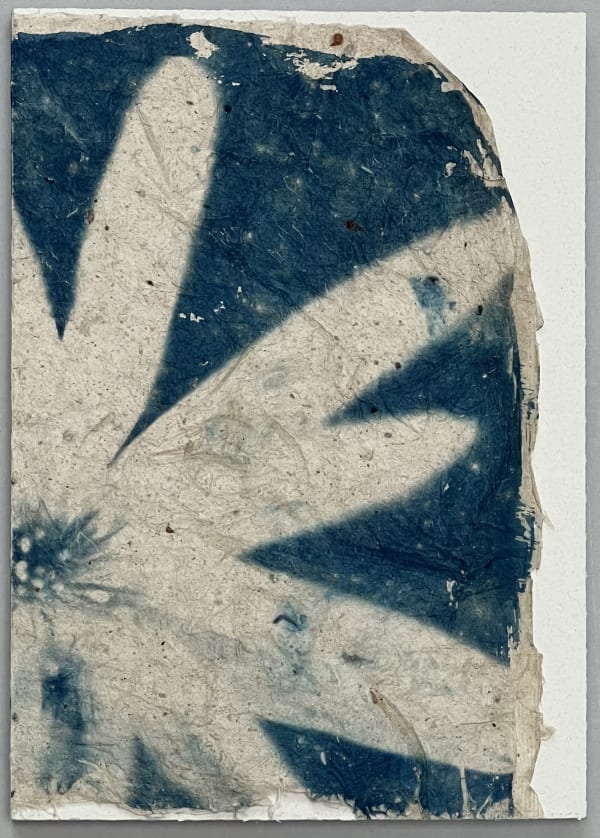
air, flowers and colours - Mika Horie
Mika Horie, 2024soft cover, 124 pagesRead more
Publisher: IBASHO & the(M) éditions
Dimensions: 240 x 170 mm -
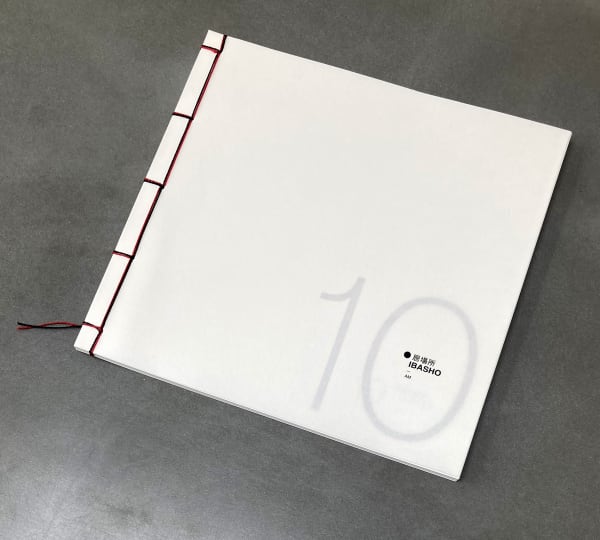
Looking Back: 10 Years of IBASHO
Exhibition catalogue various artist, 2025softcoverRead more
Publisher: IBASHO
Dimensions: 230 x 240 mm -
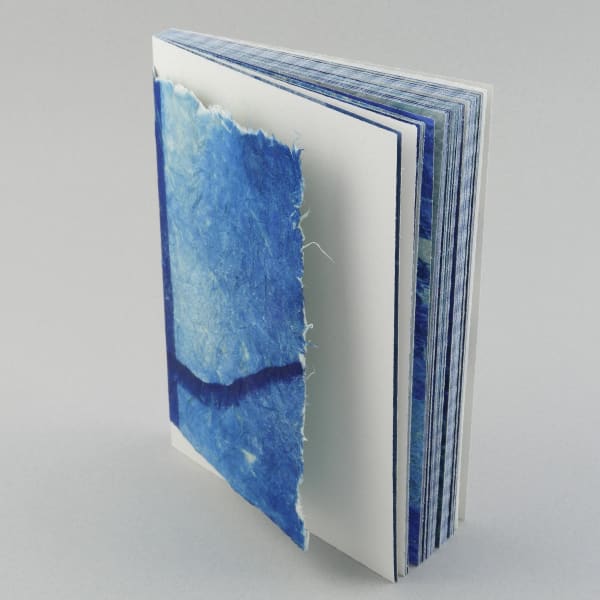
Trees, Water and Light - Mika Horie
Horie, Mika , 2022softcover, 120 pagesRead more
Publisher: IBASHO & the(M) éditions
Dimensions: 240 x 170 mm
-

#70 Looking back: 10 Years of IBASHO
23 Mar - 18 May 2025We're excited to celebrate a big milestone at IBASHO: 10 years of sharing the beauty of Japanese photography. To mark this special moment, we're hosting a group exhibition “Looking Back:...Read more -

#67 Visual poetry from Ishikawa - Mika Horie
16 Nov 2024 - 12 Jan 2025IBASHO is delighted to present “Visual Poetry from Ishikawa”, a solo exhibition of a Japanese photographer Mika Horie, together with a launch of her newest book “Air, Flowers and Colours”,...Read more -

#57 Perfectly Imperfect
Wabi Sabi in Photography and Ceramics 4 Feb - 12 Mar 2023“There is a crack in everything. That’s how the light gets in. ” - Leonard Cohen IBASHO is proud to present the group exhibition ‘Perfectly Imperfect’. This exhibition follows the...Read more -

#50 Trees, Water and Light - Mika Horie
29 Jan - 13 Mar 2022IBASHO is delighted to present Mika Horie’s work in her first solo exhibition at IBASHO: ‘Trees, Water and Light’ and her newest book with the same title, co-published by the(M)...Read more
-

#47 Mizu
Summer group exhibition on the theme of 'Water' 17 Jun - 22 Aug 2021For the annual Summer exhibition of 2021 IBASHO has chosen the theme ' Mizu ', the word for 'water' in Japanese. As an island nation, Japan has a deep connection...Read more -

#40 Wabi Sabi
11 Jun - 30 Aug 2020IBASHO is delighted to announce the Summer exhibition for 2020 which will be a group exhibition on the concept of ‘wabi sabi’. Wabi sabi as an aesthetic concept is generally...Read more -

#37 初雪 HATSUYUKI - a group exhibition on 'FIRST SNOW'
7 Dec 2019 - 12 Jan 2020A small flake of snow Came floating down Onto my forefinger Onto its tip Heaven's messenger as it were A small flake of snow Arrived floating Melted on my forefinger...Read more -

#34 NEKO Project
1 Jun - 4 Aug 2019Japanese people have had a long relationship with cats. More than 1000 years ago, people in the upper class were already living with cats. Common people also started having pet...Read more
